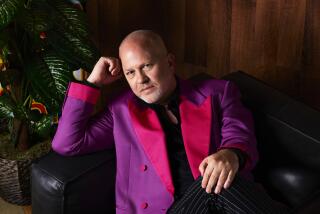‘Transparent’ throws itself into Season 2 pushing more than transgender boundaries
For evidence of just how much American attitudes have changed regarding the transgender community, one need only look at the nearest television — or, as may be the case, tablet, laptop or smartphone.
That’s where you’ll find Caitlyn Jenner, the Olympic champion turned world’s most famous transgender woman getting style pointers from her former stepdaughter Kim Kardashian in the E! series “I Am Cait,” or Time magazine cover girl Laverne Cox from the Netflix prison dramedy “Orange Is the New Black.”
And it’s also where you’ll find “Transparent,” the Amazon series that returned for a second season Dec. 11. It stars Jeffrey Tambor as Maura Pfefferman, a transgender woman and retired professor who comes out late in life, sending her three adult children on their own, frequently messy journeys of self-discovery.
See more of Entertainment’s top stories on Facebook >>
Created by Jill Soloway and inspired in part by her experiences with a transgender parent, “Transparent” has helped increase the visibility of transgender issues with aesthetics that are arguably as revolutionary as its subject matter.
In a departure from the decades-old Hollywood tradition of male actors donning women’s clothing for laughs, Maura is considered in a dignified light, with her gender identity and appearance never treated as punchlines.
This thoughtful, multilayered approach continues into the second season with new story lines, such as that of Maura’s transgender Aunt Gittel, who is introduced to us via flashbacks set in Weimar-era Berlin.
Landing somewhere between a comedy and a drama, the series has a loose, observational style fostered by Soloway and her writers, who encourage the ensemble to improvise.
But it’s Tambor’s dryly humorous, poignant and caricature-free performance that truly anchors “Transparent.”
Despite the inherent challenges of such a role, Tambor never doubted for a second that he wanted to play Maura. “I threw myself at Jill,” the actor explained recently in a joint interview with Judith Light, who co-stars as Maura’s aggrieved ex-wife, Shelly. “I mean, I wanted this. It’s my Lear.”
Maura has indeed been career-defining for the 71-year-old Tambor, previously best known for roles in more funny-haha comedies, particularly the crooked patriarch George Bluth in the beloved “Arrested Development.” But in September to the surprise of exactly no one, he won the Emmy for lead actor in a comedy series, a victory that also signaled the increased profile of streaming networks at an awards show known for its institutional resistance to change.
See the most-read stories in Entertainment this hour >>
In the current season, Maura struggles with loneliness as well as the scrutiny she feels coming from others, both of which serve as painful reminders that coming out is just the first of many challenges for a transgender woman. Still, for Tambor, who jokes that he was “the kind of student who underlined every word in a book,” taking part in Maura’s unpredictable journey has been nothing but rewarding.
“It’s such a pleasure to not know exactly where you’re going — maybe that’s why I like Maura so much,” he said. “Maura literally does not know so much. She doesn’t know how to make up her face, she doesn’t know how to select a heel, or indeed who a true friend is. To play that is very, very daunting and yet liberating.”
Acclaimed as it is, Tambor’s performance has been criticized by some activists who argue that a nontransgender man playing Maura amounts to a kind of blackface.
Tambor says he agrees “to a degree” with the critique, calling the role a “huge honor.” In the service of getting Maura right, he relies heavily on input from those he refers to as his “teachers” in the trans community, including the artists Zackary Druker and Rhys Ernst, who are consultants and producers on the series. He thanked both by name at the Emmys and dedicated his victory to the trans community.
“There’s this constant tapping on his shoulder, which is his awareness of the responsibility,” Light said. “His politics are in his performance.”
They want feedback
The spirit of openness that guides Tambor no doubt trickles down from Soloway, for whom “Transparent” is an intensely personal project. The writer was inspired by the experiences of her “Moppa,” who came out as a trans woman at age 75. (Gaby Hoffmann’s character, Ali, uses the same term for Maura.)
“I hope the trans community feels like they have a partner in us,” said Soloway, who has directed about half the episodes and welcomes feedback of all kinds. “Tell us more, tell us everything we’re getting right, what’s beloved, what’s hated.”
Soloway’s inclusive approach extends to the set, which has gender-neutral bathrooms, and the writers’ room, which this season included its first trans female writer, Our Lady J, whom Soloway found after inviting trans women across the country to submit samples of their work. “To have a trans woman specifically really is a whole different thing,” said Soloway, who points to story lines about regendering childhood photographs and trans-amorousness that were incorporated into this season with Our Lady J’s input.
Hari Nef, who stars as Maura’s Tanta Gittel, praised the show for its textured portrayals of trans characters.
“I think that the show was a vital component in this media moment that the trans community has had over the last two years, by simply representing the trans experience in a way that’s beyond a hooker on ‘Law & Order SVU’ and showing a nuanced life, showing a person who cares, a person with problems. Good art humanizes, and ‘Transparent’s’ good art.”
Crackle and spark
Soloway’s radically democratic style stands out in a medium that is thought to be collaborative but has for the past decade or more been associated with (mostly male) auteurs known for being intensely controlling.
Hoffmann invokes the idea of the “good-enough mother,” borrowed from child psychiatrist Donald Winnicott, to explain Soloway’s creative leadership style: “You create a safe space where nobody is going to get physically hurt, everyone knows they are loved, they can do no wrong. You literally make children feel so safe they will fall on their face but they won’t break their nose, because you’ve removed all sharp objects. I believe that’s a great way to rear kids, and that’s how Jill runs her set. She’s the ideal mom. She gives us everything we need, and then she backs off.”
Soloway creates this safe space in part by encouraging the cast to improvise to such an extent that “we often don’t say anything that’s written in the script,” Hoffmann noted.
This method infuses the show with the crackle and spark of real life. In the remarkable four-minute single take that opens the second season, the extended Pfefferman clan gathers for a portrait at the wedding of eldest daughter, Sarah (Amy Landecker). Soloway’s camera holds steady, observing three generations of Pfeffermans as they fidget and kvetch in a way that will be instantly familiar to anyone who’s ever had to endure a family photo session. The scene takes a sudden turn when the photographer mistakenly refers to Maura as “sir,” and the Pfeffermans walk away in protest. It was not scripted this way: The actor playing the photographer had slipped up, and the reaction was entirely improvised.
“The genius of Jill is that she does not call cut,” Landecker said.
For all the praise rightfully heaped on Tambor’s performance, “Transparent” is about much more than Maura’s transition. An exploration of how one person’s self-deception can influence behavior of subsequent generations, it gives nearly equal air time to the struggles of Maura’s maddeningly narcissistic adult children, each of whom is facing down a particular identity crisis.
Sarah, a married mother of two, throws her seemingly content life into chaos by leaving her husband for her college flame — who happens to be a woman — a decision she seems to regret in Season 2. Josh, an aging, commitment-phobic hipster played by Jay Duplass, goes in the opposite direction, diving into a grown-up relationship with Raquel, a female rabbi played by Kathryn Hahn, and welcoming his long-lost teenage son into the family. Hoffmann is the baby of the family, Ali, jobless, adrift and deeply confused about her sexual identity.
Their struggles, it is suggested, are a byproduct of Maura’s years in the closet — as Ali says during a pivotal fight with Maura, the family religion is secrecy — and may even be traced to Tanta Gittel’s long-ago trauma.
While the show has garnered much attention for its sensitive depiction of transgender issues, less attention has been paid to its handling of other taboo subjects, particularly faith and sexuality.
“I kept pointing out to people, I don’t know if you noticed, but everyone’s sleeping with each other and using dildos and getting flogged,” Landecker said. “Like no one even noticed how ridiculously over the top and edgy this show was, which I thought was amazing.”
Boundaries are being pushed still further this season. As Landecker put it, “This year was the year of coming to work and finding out that we couldn’t wear a mic because there was no place to put one.”
One widely discussed scene arrives in the second episode of the new season, when Maura shares an intimate moment in the bathtub with her ex-wife, Shelly. Even if Maura weren’t transgender, the moment would still be remarkable for its depiction of mature sexuality.
“There’s a collective unconscious that Jung talked about. A lot of that’s happening in this particular story,” said Light. (This cast likes quoting psychotherapists.) “It’s not just about a transgender person. It’s about an authentic life wanting to be lived truthfully, and I think at some very deep level everybody relates to that. People long to be their true selves and to be loved for it.”
Twitter: @MeredithBlake
More to Read
The complete guide to home viewing
Get Screen Gab for everything about the TV shows and streaming movies everyone’s talking about.
You may occasionally receive promotional content from the Los Angeles Times.






